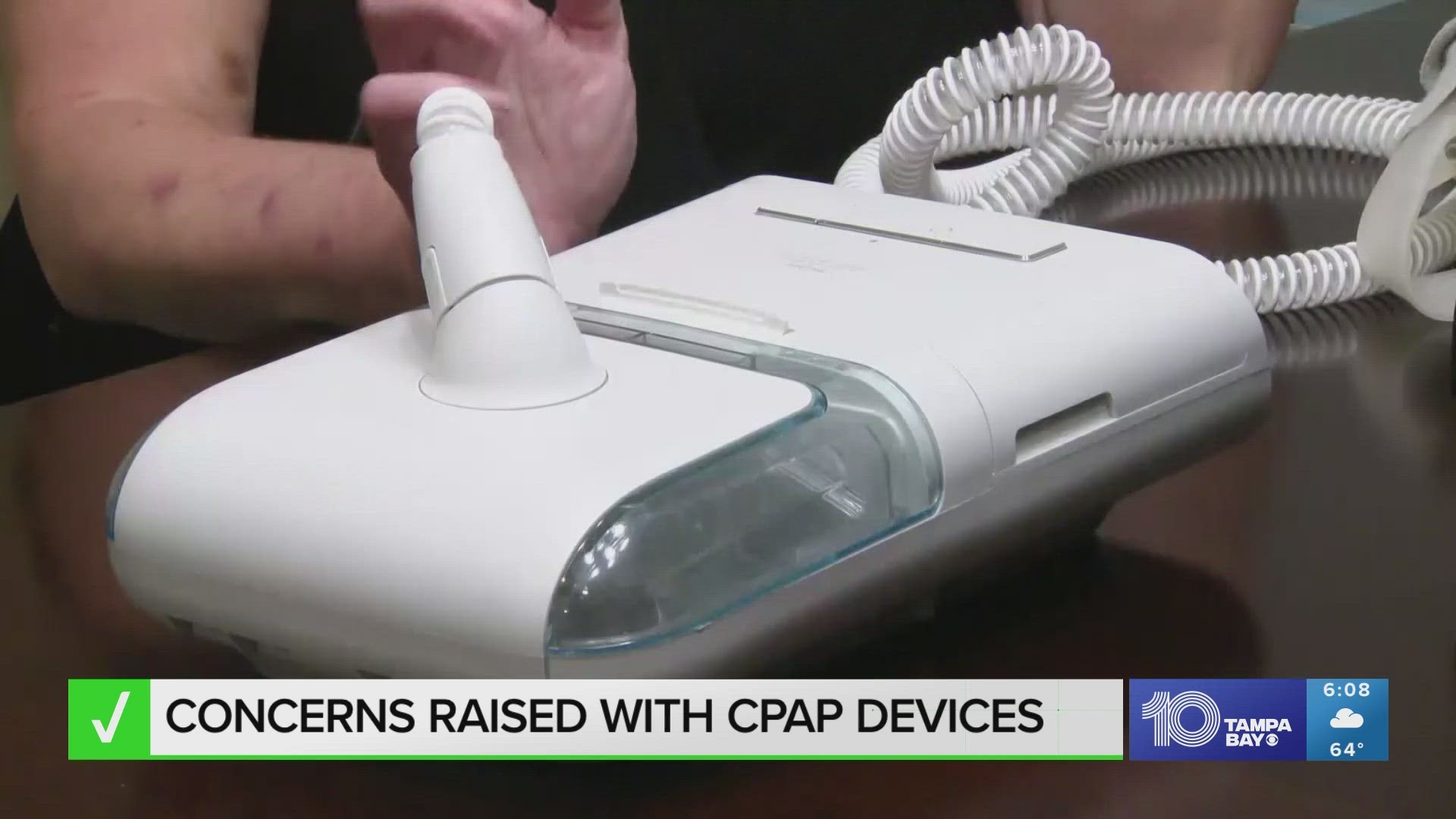Earlier this week, the U.S. Department of Justice, representing the Food and Drug Administration and healthcare technology company Philips came to an agreement to no longer sell their sleep therapy or respiratory care devices in the United States until they “demonstrate compliance with regulatory requirements.”
In 2021, polyester-based polyurethane (PE-PUR) foam used in Philips Respironics ventilators, CPAP and BiPAP machines were found to degrade and cause serious health issues or death, leading to a mass recall.
Continuous positive airway pressure (CPAP) machines are typically used by people who have sleep apnea, a condition in which a person’s breathing stops and starts while sleeping, Mayo Clinic explains. CPAP machines use air pressure delivered through a mask to keep a person’s airway open while they sleep.
Since the 2021 recall, Philips has sent out replacement devices to affected customers.
Now that Philips can no longer sell new CPAP devices in the U.S., people with replacement devices from the recall are questioning whether it's safe to continue using products from the company. VERIFY reader Sandra reached out via text to ask if the replacement CPAP devices are still safe to use.
THE QUESTION
Does the FDA recommend using replacement Philips CPAP devices?
THE SOURCES
THE ANSWER
Yes, the FDA recommends using replacement Philips CPAP devices while additional testing is being done to ensure their safety.
WHAT WE FOUND
Amid the news of Philips pulling its CPAP machines off the shelves in the U.S., the FDA and Philips still recommend that customers continue using existing devices as needed.
Instead of using the PE-PUR foam that caused the problems that led to the first recall, the replacement devices use a silicone foam, which Philips says “has met all applicable industry testing standards.”
“The remediated sleep and respiratory care devices that contain the new silicone foam may continue to be used according to their instructions for use,” a Philips representative told VERIFY.
The foam is used in CPAP devices to lessen sound and vibration, the FDA explains.
For some patients, the risks of not treating their sleep apnea outweigh the risks of using the CPAP machines with safety concerns.
“Many people may not need to stop using their Respironics device, especially those [with serious conditions] who use ventilators at home to sustain life or people with severe sleep apnea and symptoms,” Andrey Zinchuk M.D., says in a Yale Medicine article.
The FDA also recommends consumers continue using the replacement device, but adds that “at this time, the FDA does not have sufficient information to conclude whether the silicone-based foam being used in the repaired devices poses any risk to patients in the U.S.”
The FDA recommends people talk with their health care provider to discuss treatment options as “discontinuing use of one of these devices may be more harmful to a patient’s health and quality of life.”
Concerns arose in November 2021 when the FDA found that the silicone-based foam used in a similar device “failed one safety test for the release of certain chemicals of concern, called volatile organic compounds.” Volatile organic compounds can be toxic and cause a variety of health effects.
One of these compounds found to be in the silicone-based foam is formaldehyde, but Philips says the level of this chemical does not surpass limits set by the World Health Organization and the FDA.
Exposure to formaldehyde can cause irritation. If exposed to the chemical at high amounts, the Centers for Disease Control and Prevention say it can possibly cause cancer.
Since 2021, Philips has been conducting additional testing on the devices, and the FDA has continued to review data and monitor medical device reports.
In April 2023, the FDA issued another recall on some of the replaced CPAP devices because some “were assigned incorrect or duplicate serial numbers during initial programming,” which they say can cause the machine to work incorrectly or not at all.
This recall impacted 1,088 devices that were distributed by Philips between Dec. 1, 2021 and Oct. 31, 2022. Philips sent customers with affected devices a letter with next steps, the FDA says.
In November 2023, The FDA also released a safety warning specifically for DreamStation 2 CPAP machines, which were sent out as replacements after the original 2021 recall. The alert warns customers to look out for signs of overheating with the devices.
The FDA says they do not believe the overheating issue is related to problems cited in the previous recall.
The FDA received more than 270 reports of problems from using the DreamStation 2 CPAP machine between Aug. 1, 2023, and Nov. 15, 2023, prompting the safety warning.
The latest silicone foam testing update from Philips, which was published in December 2023, says “Philips Respironics has not identified any safety issues” and “final reports were submitted to FDA in August 2022.” The company adds they have not heard back yet from the FDA.
An FDA webpage that was last updated Jan. 31, 2024 says “the results from the independent testing are needed to determine if the silicone-based foam used in the repaired devices does in fact present any risks to patients, and the FDA will communicate those results to the public as soon as they are available.”
Although Philips will no longer sell new sleep therapy or respiratory care devices in the country, they will still continue to service them for people in the United States that already own them.
A representative from Philips told VERIFY “millions of patients are currently using Philips Respironics sleep and respiratory care devices. Philips Respironics will be permitted to continue servicing these sleep and respiratory care devices that are already with healthcare providers and patients, and to sell accessories (including patient interfaces), consumables (including patient circuits), and replacement parts (including repair kits) in the US.”

